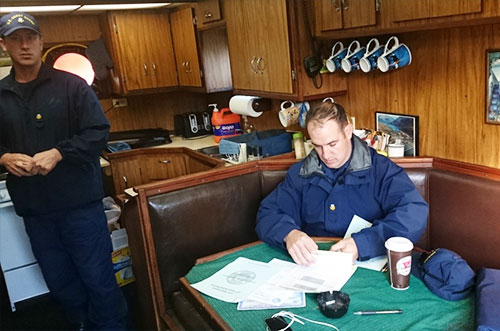
Alaska Boater Beware: Vessel documentation fraud lurks onlineBy Petty Officer 1st Class BILL COLCLOUGH
October 31, 2017
These websites lure boaters with the appearance and convenience of an official government website, but, just because a site looks like the Coast Guard and works like the Coast Guard, that does not mean it’s the Coast Guard. Boaters using these websites can end up spending three times the standard fee, and Coast Guard boarding officers will not accept their vessel’s documentation as valid.
Why? The U.S. Coast Guard’s National Vessel Documentation Center, located in Falling Waters, West Virginia, is the only authorized entity to issue Certificates of Documentation required for vessels engaged in commercial trade and optional for vessels weighing five or more net tons engaged in recreational use and activities. The NVDC is aware there are commercial entities that offer to manage the certification and renewal process on behalf of vessel owners for a fee. The Coast Guard does not endorse any of these companies, and the companies do not operate on behalf of the Coast Guard in any way. The services they provide are legal, but the certificates issued are not deemed in compliance. Any fees charged beyond the $26 renewal fee or other agreements offered by such companies are in no way associated with the NVDC certification process. In addition, these companies are not authorized to issue any form of documentation, including travel letters and/or permits that authorize operation of any vessel. “These are legitimate companies similar to the DMV [Department of Motor Vehicles] that have satellite offices open on the weekends and after hours. They’ll give you your tags, but it’s going to cost you twice as much because you’re paying for their service,” said Russell Hazlett, commercial fishing vessel examiner for Coast Guard Sector Anchorage. “These companies are not issuing the certificate, but rather, they are the middleman who charges a fee for processing the paperwork on your behalf.” According to Hazlett, many fishermen in Alaska sign up with a company to handle their annual documentation and end up paying hundreds of dollars. They often realize too late they are not dealing directly with the Coast Guard. During dockside safety examinations, Hazlett provides operators with a copy of the marine safety advisory bulletin sent by the NVDC May 16, 2017, which advises vessel operators to be aware of third party service providers. ”Just this year alone I have come across probably eight people who have fallen victim to it,” said Hazlett. “I have warned them: When you go to renew your documentation, just be aware there is another company that provides that service.” Hazlett noted that many third party websites resemble a Coast Guard website complete with an anchor-themed logo and color scheme that closely matches the Department of Homeland Security seal. A librarian in Naknek, Alaska, filed for her husband after she received an official-looking letter marked “reinstatement courtesy notice” from a website offering documentation services. The letter even listed the boat’s hull number and looked every bit like an official Coast Guard document. The website bore all the markers for an official domain except one: the non-official site ended in “.us” instead of “.mil.” “It looked like a Coast Guard site, but when you scrolled all the way to the bottom, the site claimed in the tiniest font they are not affiliated with the U.S. Coast Guard,” said the librarian. The librarian cancelled her credit card and proceeded to dispute the charge. It was when she entered “coast guard renewal scam” in an online search engine that she realized she was not alone. It turns out there are a number of forums online of fishermen in Alaska and across the rest of the country, who share their stories and seek information on how to get their money back from third-party providers. “I was worried we got scammed, which we did. I ended up paying about $150 when it only really costs $26. I was really worried we wouldn’t get the certificate in time for my husband to go fishing,” said the librarian. The wife of a fisherman in Whittier, Alaska, paid twice the standard fee of $26 after her husband received an email that stated his permit could be renewed with a fee. “I thought it was free, so I told him I’ll renew it, because the website looked so official. And that’s why I was probably duped,” she said. The charge on her credit card statement coupled with unreturned calls from the third party provider tipped her off that the transaction was not legitimate. “We thought because of budget cuts there was now a charge, but I thought to myself, hmmm, it smells like rotten fish,” she said. She disputed the charge with her credit card company on the grounds of fraud; however, the representative told her she was responsible for the charge because she agreed to it. “I said: No. You’ll need to look up Webster for the definition of fraud. Fraud means that someone misrepresented their intention,” she said. She eventually received a refund after talking to a supervisor, but not every boat owner is so lucky. When it comes time to renew the documentation, always remember the Coast Guard website offering documentation uses a .mil domain name. Web domains using .us, .com and .org are not authorized by the USCG. Get the Coast Guard-approved certificate that helps save money just like a Coast Guard-approved life jacket helps save lives. For more information on Certificates of Documentation call the Coast Guard’s NVDC at 800-799-8362 or visit http://www.uscg.mil/nvdc/
Representations of fact and opinions in comments posted are solely those of the individual posters and do not represent the opinions of Sitnews.
|
||||
